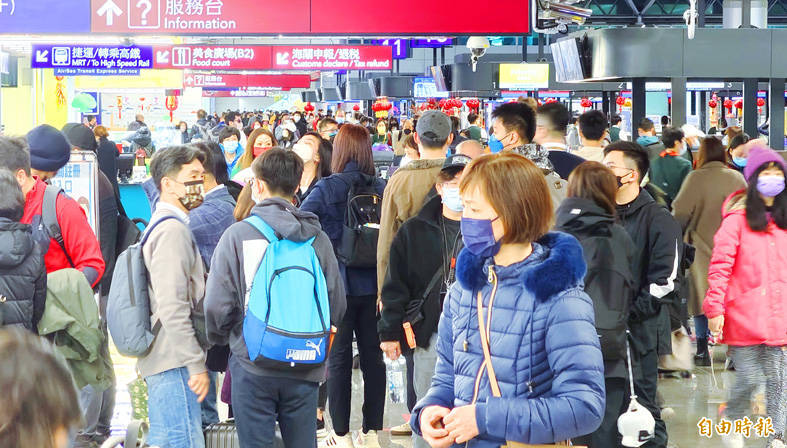Travelers crowd the Taiwan Taoyuan International Airport yesterday, the second day of the 10-day Lunar New Year holiday. Photo: Tony Yao, Taipei Times
PROTECTION: Aside from preparing drugs, masks and sanitizers against COVID-19, people with chronic illnesses can have their prescriptions filled before traveling abroad
By Lin Hui-chin / Staff reporter
With people hitting the road during the 10-day Lunar New Year holiday, a healthcare expert advised preparing six types of protection as a safeguard against COVID-19 and other types of diseases.
First is preparing drugs to treat COVID-19, flu and cold symptoms, including fever, pain, runny nose, cough and sputum, Federation of Taiwan Pharmacists Associations spokesperson Huang Yen-ju said, adding that parents can prepare liquid solutions for children who do not know how to take pills.
Many people have already been vaccinated against COVID-19, so even if they contract the virus, they are likely to be sick for about five days only, he said.
Acetaminophen (Panadol, Tylenol and other brands) is commonly used to treat fever and pain, he said.
The typical dosage is one 500mg tablet at a time for up to four times a day, he said, warning that overdosing could cause acute liver damage, so people with liver disease have to be especially careful about how much they take.
Ibuprofen is a type of non-steroidal anti-inflammatory drug that is also widely used to relieve pain and inflammation, but it can cause stomach irritation or ulcers, and some people might have an allergic reaction to it, he said.
Many people think that if taking a pill does not work, they should take two or three more, but that could lead to an overdose, Huang said.
If taking one pain reliever is not enough, they should consider taking another type of pain reliever with different ingredients or metabolic pathway and ask a pharmacist on how to take such drugs, he said.
Antihistamines are often used to relieve a runny nose, sneezing, or skin allergies, especially in the winter, when many symptoms of allergies worsen, he said.
First-generation antihistamines work by affecting the histamine receptors in the brain and spinal cord, and can cause sleepiness, while second-generation antihistamines, which do not cross the blood-brain barrier and hence do not cause drowsiness, which would be better for people who needs to drive or concentrate, he said.
Second is masks and alcohol-based hand sanitizers, Huang said.
While surgical masks are good, people taking long-haul flights could consider using N95 respirators, especially if passengers nearby show symptoms of respiratory problems he said.
Third is having at-home COVID-19 rapid test kits, a pulse oximeter and a thermometer, he said, advising people to take a rapid test when they develop symptoms to protect their travel companions, and to have a pulse oximeter at hand if their travel companion has underlying health conditions.
The fourth is essential medicine for travelers, such as drugs for allergies or motion sickness, he said, adding that people who are traveling to countries with lower hygiene standards should prepare drugs to treat diarrhea or topical ointments for outdoor injuries.
The fifth is medicines for chronic health conditions, Huang said.
People who need to refill their prescriptions for chronic illnesses can do so from Jan. 10, while those traveling abroad for more than a month can refill their prescriptions for up to three months by presenting their plane ticket and an affidavit, he said.
Lastly, people should have their medical records on hand, he said.
They can download the National Health Insurance Administration's mobile app (National Health Insurance Administration's mobile app), as well as keep their over-the-counter or prescription drug packets which contain information about the medicine they are taking and show them to healthcare providers when they seek medical attention abroad to avoid adverse drug reactions, he said.
In other news, the Central Epidemic Command Center yesterday reported 20,773 new local COVID-19 cases, 305 imported cases and 33 deaths from the disease.
The total number of cases rose 3.1 percent from the same day a week earlier, it said.
Additional reporting by CNA
News source: TAIPEI TIMES
